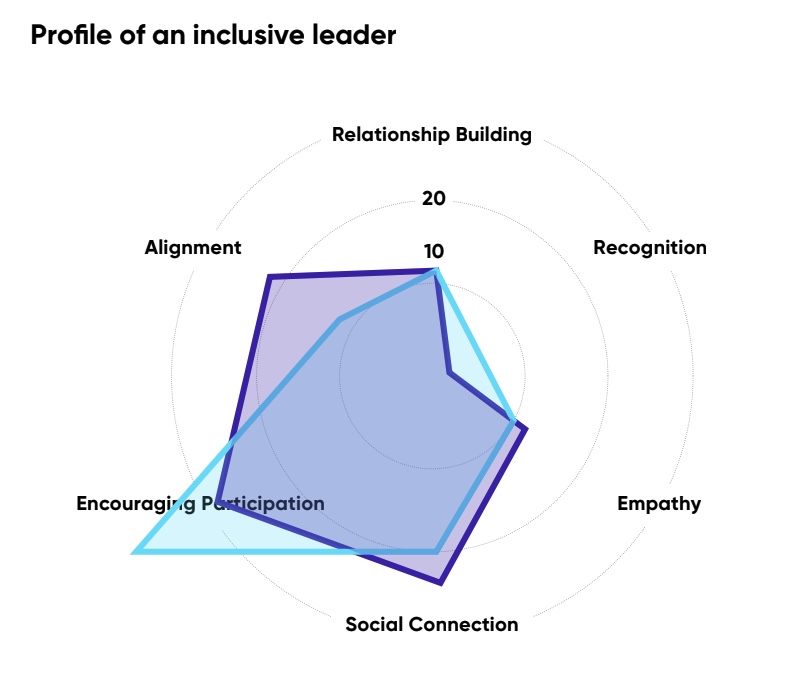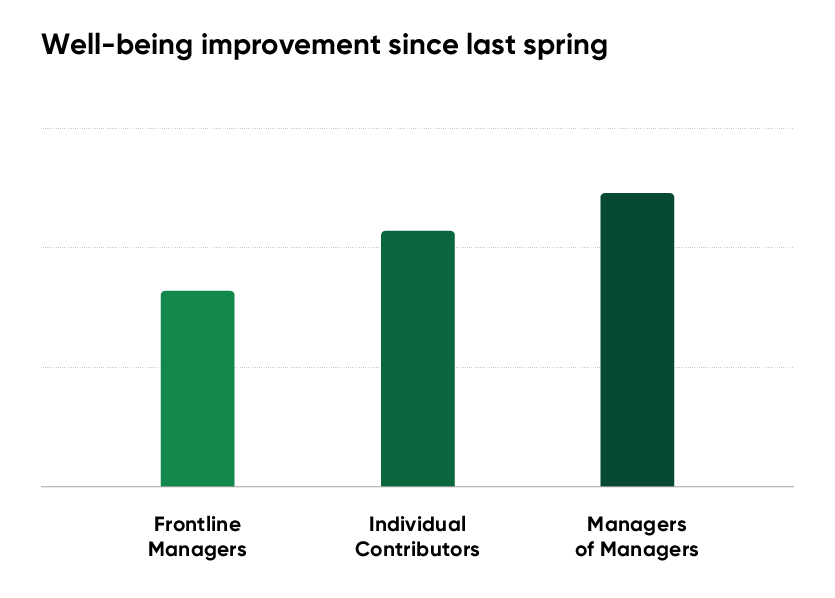Jump to section
Managers are the linchpin to fostering inclusion at the forefront of change
The skills behind inclusive leadership in the new workplace
To lead the change, frontline managers need to be the change
For Business
Products
Build leaders that accelerate team performance and engagement.
Drive productivity through sustained well-being and mental health for all employees with BetterUp Care™.
Solutions
Transform your business, starting with your sales leaders.
Foster a culture of inclusion and belonging.
Customers
See how innovative companies use BetterUp to build a thriving workforce.
Resources
Best practices, research, and tools to fuel individual and business growth.
View on-demand BetterUp events and learn about upcoming live discussions.
The latest insights and ideas for building a high-performing workplace.
Innovative research featured in peer-reviewed journals, press, and more.

Jump to section
Managers are the linchpin to fostering inclusion at the forefront of change
The skills behind inclusive leadership in the new workplace
To lead the change, frontline managers need to be the change
As we re-emerge and enter a post-pandemic era of work, we’re faced with a complex landscape. The workplace has changed more in the last 18 months than it has in the previous decade. COVID-19 dramatically shifted how we collaborate and communicate, and the line between “work” and “life” is fuzzier than ever before.
Hybrid forms of work are on the rise. Some employees are returning to the office full-time, some are staying remote, and some are straddling the line with either mandatory or elected mixes of in-office and remote days. The result of not having a physical presence in the office full-time means missing out on the connections, influence, and visibility required to experience job satisfaction and to feel the commitment and belonging that drive intent to stay.
In fact, our research identified a “belonging tax,” a widespread drop in the sense of belonging for employees in a hybrid work arrangement. Underrepresented group members are 1.6X more likely to have low belonging and disproportionately more likely to leave as a result.
Moreover, the fragmenting needs and demands of underrepresented groups, women, parents, and others in the workforce and the ongoing widespread mental health concerns represent a broadening scope of new concerns for organizations and people leaders. Geography and the work arrangement itself become another dimension of diversity. Employees also now demand space, support, and trust from their organizations. They want to work with a diverse, inclusive team where they can be their authentic selves.
In addition, managers often now are the first line of support for mental health.
In fact, 35% of organizations now rely on managers to communicate with their teams about mental health. In a recent Qualtrics survey, 50% of employees reported feeling comfortable reporting any potential mental health challenges to their manager.
The situation is dynamic. The dimensions to navigate are complex.
A fresh take on inclusive leadership can help leaders at all levels build bridges between their people and the organization, especially as we enter a new era of hybrid work across the country. Managers are key to driving this change.
Communication, collaboration, and people guidance across this diverse hybrid workforce fall on the manager. Managers shape the employee experience. Now more than ever, they have a direct impact on employee satisfaction, productivity, and turnover.
Managers who are open and inclusive are key to fostering a greater sense of belonging in the workforce. When managers are seen as inclusive, their team members report 3.4X higher job satisfaction, 2.7X higher commitment, and 1.9X higher engagement than average. Individuals with inclusive managers also report a 20% higher perception of support from their organizations.
The predictive power of a manager's inclusive leadership on an employee feeling a sense of belonging has increased 26% since the start of the pandemic.
Given remote work arrangements tend to be preferred by certain populations, such as working mothers relative to working fathers, not providing the right support for managers to develop new inclusive leadership skills could harm DEIB efforts, and the organization, for years to come.
Managers both bear the responsibility and the opportunity to create inclusive teams in this new era. To support their teams in this new world of work, managers need to re-learn how to lead and manage inclusively and effectively under these conditions. Yet managers tend to be under-supported — economically, emotionally, and in organizational resources — especially middle and frontline management.
Organizational investment now needs to focus on helping people managers develop the skills to support the changing and unique needs of various employee populations in a hybrid environment. Organizations can no longer afford to treat inclusive leadership as a specialized skill. Inclusive leadership is an essential skill for every people manager.
The good news is that inclusive leadership isn’t expected to come naturally to all people managers. With coaching and support, managers can adapt and improve key skills for promoting inclusion and leading effectively in hybrid work environments. Our research shows that while those skills are the same as they were pre-pandemic, their relative importance has changed. More importantly, how a manager deploys these skills might look different now.
What are the skills that support inclusive leadership in a hybrid environment?

Some managers quickly developed these skills with their remote teams when everyone was struggling to adapt to the lockdowns. As we move into a hybrid environment, managers have to readapt. Different work arrangements mean different access to information, communication channels, formal and informal relationship-building opportunities, networking, and social connection. The desire for hybrid work may also reflect that people are at different life stages with different stressors, demands, and even aspirations. Managers need to recognize each employee as a unique individual with changing needs over time.
Managers may be wondering:
In a hybrid environment with heightened expectations from employees, managers need to be more deliberate in how they consider their impact on team members. They should also pay attention to the impact of team members on other team members.
Most importantly, managers need to proactively touch base and provide space for tough conversations. This means leaving time during one-on-one meetings for personal conversations or emotional support. The time required to touch base with employees doesn’t compare to the effort required to replace an unhappy or overworked team member.
Managers also need to be thoughtful about equalizing expectations and hold all team members accountable for their objectives — regardless of where they work.
This means offering equivalent levels of growth opportunities and interactions whether team members are remote or working in person.
As companies continue to work from home, the role of the manager has grown considerably. They’re no longer just responsible for work and productivity — they’re also keeping company culture alive and serving as a lifeline to employees as they navigate the challenges of remote work.
Angela McKenna, Senior Vice President of Talent Experience at Salesforce
All in all, managers should approach hybrid work as an experiment with lots of coaching, feedback, and forgiveness — for both their team members and themselves.
As a people manager, it’s one thing to recognize the importance of inclusive leadership … it’s another to feel up to the task.
While managers need organizational support in developing the skills to support their teams in this new world, they also need organizational support for developing the skills to support their own well-being. It’s hard to be open and inclusive when you’re not experiencing well-being yourself.
Our data showed that the lowest point for well-being occurred in June 2020 and had stabilized by spring of 2021.
Despite the rebound, the challenges from the pandemic are still reverberating for frontline managers. They’ve had a slower recovery of well-being relative to both individual contributors and higher-level managers. Many are experiencing burnout or languishing. They need help from their organizations more than ever before.

As we move toward a post-pandemic world, inclusive leadership across the organization has never been more important. Why? Because a sense of belonging is critical for attracting and retaining talent as well as maximizing the potential of the workforce you have
What it means to lead inclusively is playing out against a backdrop that is fundamentally more complex. People managers are at the forefront of making hybrid work, work, in a more complex environment.
These managers need organizational support to play this key role in fostering well-being, sustaining performance, and cultivating belonging in your teams. For organizations, inclusive leadership is no longer a nice-to-have, it’s essential.
At BetterUp, we’re in a unique position to understand how our BetterUp Members are faring over time — from a leadership and performance perspective and in terms of their well-being and personal growth. In our latest research, Redefining Inclusive Leadership, we explore the unique differences, challenges, and needs of populations impacted by the pandemic, including those in leadership.
Managing Editor
Products
Solutions
Customers